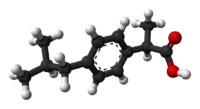
Photo from wikipedia
Osteoarthritis (OA) is one of the most prevalent chronic degenerative joint diseases affecting adults in their middle or later years. It is characterized by symptoms such as joint pain, difficulty… Click to show full abstract
Osteoarthritis (OA) is one of the most prevalent chronic degenerative joint diseases affecting adults in their middle or later years. It is characterized by symptoms such as joint pain, difficulty in movement, disability, and even loss of motion. Moreover, the onset and progression of inflammation are directly associated with OA. In this research, we evaluated the impact of Flavokawain A (FKA) on osteoarthritis. In-vitro effects of FKA on murine chondrocytes have been examined using cell counting kit-8 (CCK-8), safranin o staining, western blot, immunofluorescence staining, senescence β-galactosidase staining, flow cytometry analysis, and mRFP-GFP-LC3 adenovirus infection. An in-vivo model of destabilization of the medial meniscus (DMM) was employed to investigate FKA’s effect on OA mouse. An analysis of bioinformatics was performed on FKA and its potential role in OA. It was observed that FKA blocked interleukin (IL)-1β-induced expression of inflammatory factors, i.e., cyclooxygenase-2 (COX2) and inducible nitric oxide synthase (iNOS) in chondrocytes. In addition, FKA also downregulated the catabolic enzyme expression, i.e., aggrecanase-2 (ADAMTS5) and matrix metalloproteinases (MMPs), and helped in the upregulation of the anabolic protein expression, i.e., type II collagen (Col2), Aggrecan, and sry-box transcription factor 9 (SOX9). Moreover, FKA ameliorated IL-1β-triggered autophagy in chondrocytes, and it was observed that the FKA causes anti-inflammatory effects by the mitogen-activated protein kinase (MAPK) and phosphoinositide-3-kinase/Akt/mammalian target of rapamycin (PI3K/AKT/mTOR) signaling pathways inhibition. The results of immunohistochemical analysis and microcomputed tomography from the in vivo OA mouse model confirmed the therapeutic effect of FKA. Finally, we assessed the anti-arthritic impacts of FKA by conducting in vivo and in vitro analyses. We concluded that FKA can be employed as a useful therapeutic agent for OA therapy, but the findings require needs further clinical investigation.
Journal Title: Frontiers in Bioengineering and Biotechnology
Year Published: 2022
Link to full text (if available)
Share on Social Media: Sign Up to like & get
recommendations!